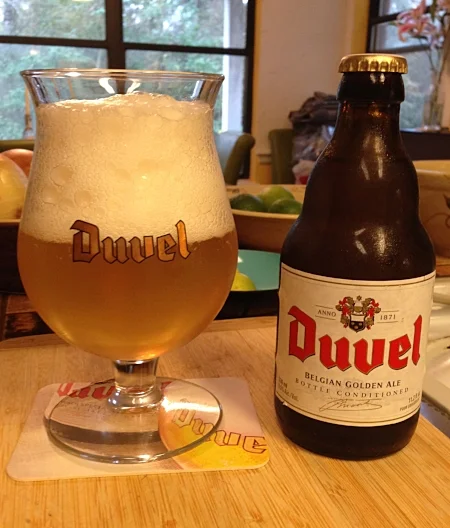439 : Duvel - Biere Speciale
The Red Duvel
In the bottom of a genuine Duvel tulip glass there is a small letter "D" etched in the glass. Technically called a nucleation point, this is to help the aeration of the beer in the glass by causing the release of some of the beer's carbonization. Also, the proper pour of a glass of Duvel has the foam starting about half-way up the word "Duvel," then going to the top. Not too bad, here.
Duvel - The Devil! In 1923, local shoemaker Mr. Van De Wouwer was so excited by the beer he was drinking he exclaimed, "This is the real Devil!" Devil in Dutch is Duvel (or Duivel). From then on this beer was sold under the name Duvel, and even the script used on early advertising had little forked tails.
The story starts in 1871, when Jan-Leonard Moortgat, himself the son of brewers, founded his own brewery, adding one more brewery to the already over 3,000, some say over 4,000, then brewing beer in Belgium. The Moortgat brewery was located in the town of Puurs, about halfway between Brussels and Antwerp. By 1900, his beer had become so popular that he was making regular deliveries down to Brussels, via horse cart.
Around the time of the First World War, Jan-Leonard's son Albert, who was now the brewmaster, traveled to England, and being rather impressed by the local ales he sampled, decided upon returning home to create as new beer based on these English ales. Since yeast plays such an important part in the taste of a beer, Albert wanted to use the best, and after some initial rebuffs by several English brewers, he found an appropriate strain being used by a Scottish brewer. The new beer was released shortly after the end of the war, and was aptly dubbed "Victory Ale." Then, in 1923, after the shoemaker's animation upon tasting the beer, it was renamed Duvel.
Duvel - Belgian Ales.
In the late 1960s, the third generation of Moortgat brewery designed the iconic tulip-shaped glass, to more fully appreciate the Duvel you are drinking. In the 21st Century, a fourth generation of the Moortgat family is now running the show, still making a fine beer, as well as adding new varieties to their product line and expanding into a world-wide market, including the United States. Fortunate for us. And, by the way, they still use yeast cultured from that original strain brought back by Albert.
This Duvel, which is top fermented with an additional fermentation in the bottle, is also known as the Red Duvel, as opposed to a lighter, lower alcohol version called the Green Duvel, which is presently only available in a small market in Belgium.
The Duvel Moortgat brewery is located in the tiny village of Puurs, Belgium. Little Puurs is so small that it rarely shows up on any maps - in this case a U.S. Army road map printed in 1942 by the U.S. Army Mapping Service. In this map image, the Duvel Moortgat brewery is located just south of the bend in the road, under the letter “B” in the name Breendonck, right about where the church symbol can be seen. This is about half-way between the cities of Antwerp and Brussels.
Like is common among many small towns in Belgium a consolidation of villages took place, essentially combining all municipal functions under one entity. Thus Puurs joined with the villages of Breendonk, Liezele, Kalfort, Ruisbroek to form one municipality. On 1 January 2019, the village of Sint-Amands joined the group, with the municipality now called Puurs-Sint-Amands.


